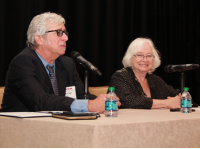August 4
Closing Keynote
0 comments

Rima Rudd, Sc.D., Harvard T.H.Chan School of Public Health & Michael Villaire, MSLM, Institute for Healthcare Advancement
Dr. Rima Rudd and Michael Villaire closed the conference with their final thoughts and major takeaways. Rudd’s first observation was that the conference goers, speakers, and poster presenters have taken a leap outside and we are clearly working outside some of the boxes created in the early years of health literacy.
We are no longer myopically focused on the skills of patients but are taking a clear look at the skills and abilities of health professionals and the characteristics of health and healthcare institutions that erect literacy related barriers to information and care. We are also no longer solely focused on the activities within the clinical encounter or taking place with the hospital or medical setting. Instead, we are engaged in public health work with a clear link to issues of disparities and equity, access to information, access to care and services, and the availability of usable and accessible tools for action.
In spite of this progress, we still tend towards a focus on disease management and will need to look at more distant horizons related to the health of our communities, occupational health and safety, environmental health and climate change, disaster preparedness and management. Additionally, we need to be attentive to the voices here calling on us to be aware of discrimination and bias, and calling out for attention to social justice. Rather than label groups of people as hard to reach, we must improve our skills to reach out to people our society has ignored for too long.
At this year’s conference several speakers and presenters highlighted the ways in which academia and clinicians have worked together to implement health literacy best practices to create better health outcomes for their patients. We clearly know and value the scientific insistence on research based practice – putting into practice the findings from well designed research studies. However, the oddity for us is that practice is ahead of the curve and many research studies are still a bit stuck.
Many studies are still focused on who has or who does not have strong literacy skills. Others are still examining the capabilities of patients without considering the other key variables in the equation, such as the communication skills of the health professionals, the context of institutional environments, the writing skills of those who construct key information, forms, and documents, or the missing rigor in the design, development, and piloting of our health tools and texts.
Practice – as represented here in panels and talks, and on posters – is well ahead of the curve and people present here have been moving ahead:
Many of these efforts are accompanied by rigorous evaluation studies. Dr. Rudd articulated the need to shift the bias in publishing from academia to practitioners who are getting at the deeper causes of low health literacy and disparate health outcomes.
Tags